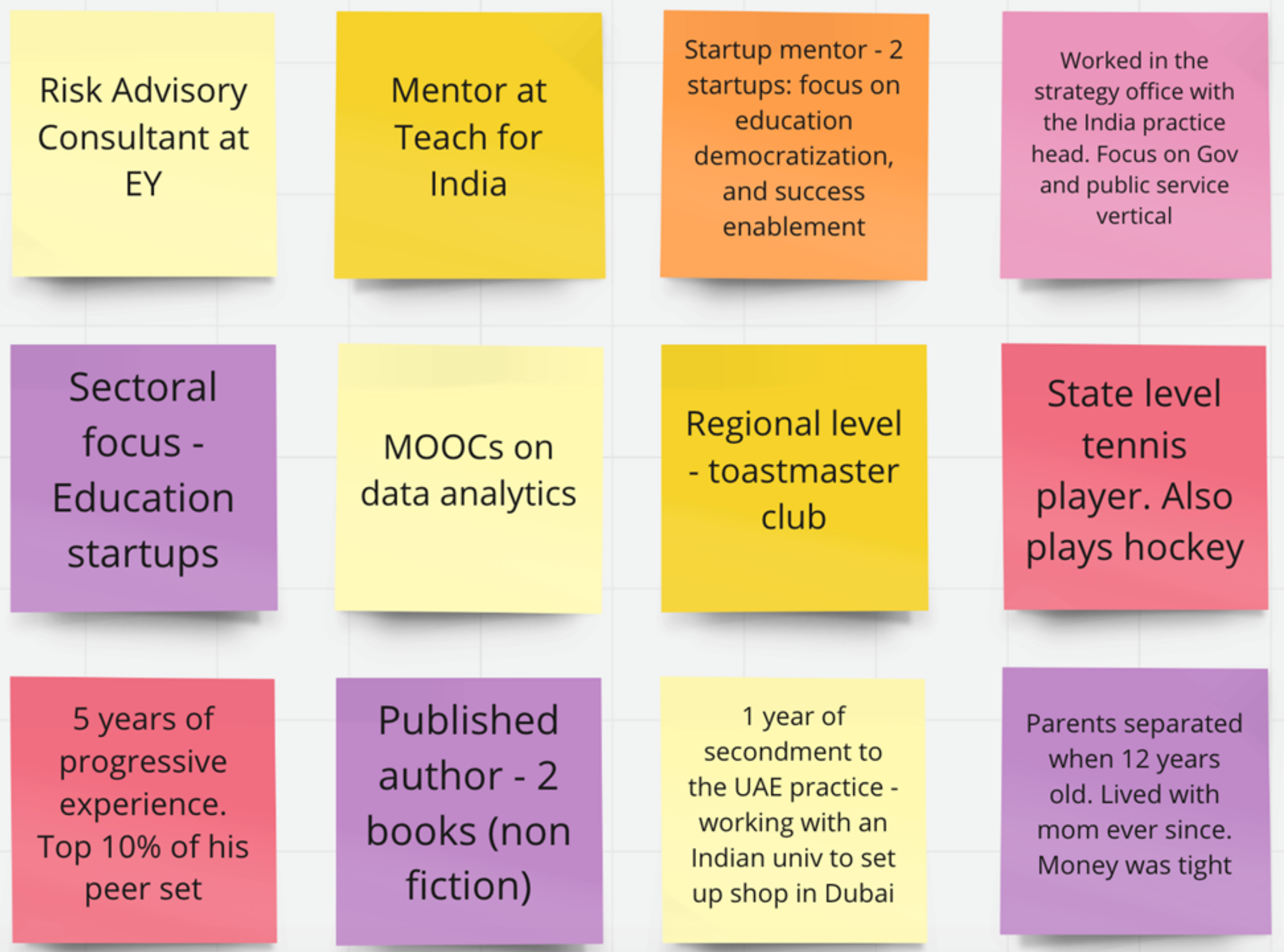Admission Case Study - What not to focus upon
- Written by UnivAdmitHelp
- Category: Admission Application
- Published on 05 May 2022

A mind-map is a good way to look at the profile of a person. The picture above is a summary of the key elements of an MBA aspirant. As I work with students, especially the ones who are looking to get to M7 business schools, one of my key jobs is to draw out the positional statement for a student. A 2-line statement that pithily summarizes the key positioning anchor is often the most creative, and challenging part of the job!
What comes to your mind when you look at the above picture? Also remember, that this example is primarily chosen to highlight what not to pick up as your key positioning anchor.
For example, I see a lot of people picking up personal adversity anchor - around growing up in a one-parent household, where money was tight as a key dimension of this person’s profile. However, this adversity did not lead to anything significant by way of accomplishment. And in fact, the real adversity was borne by the mother of the applicant. Plus it is non-verifiable. That is not a strong anchor.
Another common anchor picked up by people is around consulting and problem-solving. While a sought-after quality at a B school, this one is not sufficiently differentiated. In the current scenario, at least 30% of candidates applying to B school have some sort of consulting background and a generic risk-advisory consulting experience may not be powerful enough to get you a second look.
A few people also pick up sports experiences or book publishing. While these anchors are interesting, they lack depth and correlation with the B-school experience. From the information given, it does not seem that these anchors correlate strongly with the candidate’s life or career objective. In such a situation, it's best to let these be. These could be used as a filler in some of the ancillary answers but certainly not the core positioning of the candidate.
There are a significant number of people who adopt an all-around positioning. These would talk about consulting, sports, personal adversity, and book publishing. Again, unless each of the respective elements are top-notch, this positioning leaves the admissions team confused because they are unable to pick up a singular defining thread.
We ended up choosing a positional statement around education-ventures. The positional statement was, “To progressively build upon varied education-development consulting and teaching experiences in India and abroad to create a meaningful resource for learning-outcomes improvement at primary-school kids, specifically in Maths and English..” There are a few dimensionalities of this anchor -
- It is rooted in extensive experience
- It is verifiable
- It has a futuristic element, thus justifying the need for a B-school experience
- It has different dimensions - spread across professional work, as well as volunteer experience
This anchor was built into different essay answers and was iterated multiple times before the final essay documents came about. However, much of the battle was won the moment the candidate arrived at the aforementioned positional statement.
This student got a 30K scholarship at SOM, Yale, and also an acceptance at Sloan, Kellogg, and Cornell. He valued the scholarship amount quite a bit and chose SOM, Yale over other schools.
Other Related Blogs:
Positioning ideas for B School applications: Consulting profiles
B School Applications advice for people who have worked in startups
Strategic College selection for your MBA applications
Recent Posts
-

Comprehensive List of 30+ questions that High School Indian Parents and Students ask for US Admissions..
-

Common App Essay Tips 2025
-

Best extra-curricular activities for college admission for Indian students
-

How Many Universities Should You Apply To? Expert Tips for U.S. and U.K. Admissions for Indian Students
-

Step-by-Step Guide to Creating an Exceptional Capstone Project for Indian Students




